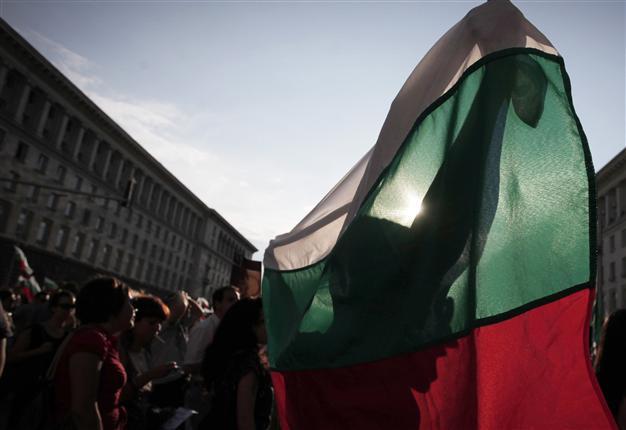Bulgaria removes state security chief appointment over large protest wave
SOFIA - Reuters

Protester holds Bulgarian flags and shouts anti-governmental slogans during the fourth day of massive protests in Sofia, Bulgaria, June 17. AP photo
Bulgaria's parliament dismissed a powerful media figure from his post as head of national security on June 19, hoping the move will put an end to protest rallies against the country's fragile three-week-old government.
Thousands of Bulgarians have been demonstrating in Sofia and other cities since last June 14 demanding that the Socialist-led coalition quit after it hurt its credibility by naming lawmaker Delyan Peevski to head the security service without any debate.
Peevski, 32, has no experience in the security field and Bulgarian media say he stands behind a powerful network of national newspapers and television channels owned by his mother.
Political analysts say Peevski's appointment to a highly sensitive post was another example of how shadowy private interests dominate state institutions in Bulgaria, the European Union's poorest member state and one of its most corrupt.
"(Removing Peevski) is a clear political act showing that lessons were learnt," Socialist leader Sergei Stanishev said. "This decision is a clear sign we are taking into account the people's voice."
The Socialists have launched public consultations to pick Peevski's replacement and have also agreed to reform an outdated electoral system to soothe concerns over the rule of law.
In a further conciliatory move, the parliament on June 19 backed government plans to help the poor by raising the minimum wage from October and state pensions in line with inflation from next year.
MRF memberThe Socialists and their junior coalition partner, the ethnic Turkish MRF party, have said they will ask Bulgaria's constitutional court to rule whether Peevski can take back his seat in parliament - an option that protesters strongly oppose.
MRF leader Lyutvi Mestan said Peevski, an MRF lawmaker, would not return to parliament before the court ruling.
Bulgaria joined the EU in 2007 but Bulgarians remain deeply frustrated with their politicians' failure to tackle corruption and organised crime, which deter badly needed investment and keep living standards low.
"We are here not because of poverty or money. This protest is a moral one, it is for democratic values and for our future. We are tired of lies and behind-the-scenes arrangements," said writer Milena Fuchedzhieva, protesting in Sofia.
Bulgaria's previous centre-right GERB government was forced to resign in February after mass protests over low living standards and a failure to tackle graft.
GERB returned to parliament as the biggest political grouping after May's election but failed to secure a working majority, leaving the second-placed Socialists to cobble together a minority government that has to rely on the passive support of a small nationalist party.
